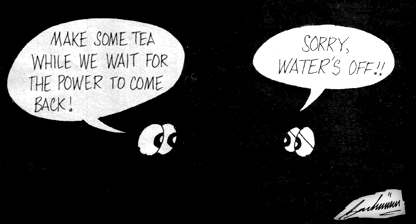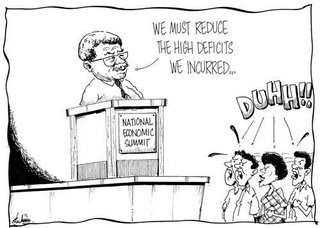
Sitiveni Rabuka trial has started off with a controversial note. Without a doubt the issue of tampering, influence of the judiciary system raises its ugly head.
Further to the subject of interference, Fiji Police continues to fast track the Sedition case on Commander Frank B whilst placing stumbling blocks before the treasonal case of the 2000 coup which is still pending.
Fiji P.M trying to force the Cabinet members into his line of voting is detrimental to transparency, democracy and makes a mockery of independent thinking and voting.

Above: Sitiveni Rabuka at his present trial.
Fiji Times reports that, the matter of Australia micro managing Fiji's domestic affairs and not withstanding their recent stunt of importing arms and men via Nadi International Airport, has been viewed by the Fiji Army as a clear and present danger.
This obscure Biketatwa declaration ratified by this Regional Assistance Mission to the Solomon Islands (RAMSI) organization.
Undeniably the first congratulatory reports on the success of applying Biketawa declaration originates from an Australian Foreign Affairs official with a job title called Special Coordinator for the RAMSI mission.
Fiji Sun article on the financial discipline demonstrated from the P.M's office proves the point that on a national level those misappropriations are magnified ten fold.
Qarase’s staff have access to advances
By SAMANTHA RINA
Staff of the Prime Minister’s Office were allowed to take advances although their previous advances were not accounted for. The Auditor-General report revealed the staff failed to follow procedure where their advances have to be cleared within sevens days and if not the interest should be charged on all outstanding accountable advances.
The report showed that staff took advances ranging from $67.50 to $20,000 mainly when on overseas assignment with the Prime Minister.
“Although these advances have remained outstanding over a considerable length of time, no evidence was sighted of recovery actions,” it stated.
The A-G stated that towards the end of last year the outstanding advances to be recovered stood at $33,267. The PM's Office said that officers had been verbally advised by the accounts section to clear the outstanding advances, but clearances are only made on piece meal basis regardless of repeated reminders.
"We will have to seek the approval of the CEO to advise the Minister of Finance to activate deductions from salary to recover outstanding advances."
Letters to the Editor inFiji Sun online issue of Tuesday November 14th underscores the frustration of the Fiji public.
An interesting one echos the sentiments of S.i.F.M.
Tell the truth, Mr Hughes.
Well, well, well, the cat is finally out of the bag and Commissioner Hughes will have to answer a lot of questions basing on what is unfolding before our eyes.
He has to try and shake off the lingering suspicion in the minds of the people of this country that his actions in the last week were totally independent and free from any political influence by government on the part he played in complementing the strategy to sack Commodore Bainimarama in absentia. He has gone public accusing Captain Teleni and the Army of taking by force something that rightfully belongs to them and was legitimately brought into the country for normal military use. And mind you they have had that container of ammunition at QEB for over a week now and still there’s no coup!!
May I ask Commissioner Hughes as to who came up with this funny idea about the coup in the first place? It was due to that funny assessment according to Hughes that he suddenly wielded his absolute licensing power for the whole world to know and went ahead to try and stop the ammunition consignment which was then still in high seas from reaching QEB. It is now obvious that the real reason lay elsewhere!!
It is now questionable whether his powers under the constitution are still being exercised with absolute independence and untainted by politics. I think not. Lately, there is a lot of suspicion that he was influenced politically to do what he did and was actually advised not to consult the army but to blow up the ammunition issue publicly when the time is right using the element of surprise.
I say that because it is really hard not to believe that a part of the strategy was for him to kick-start the whole move the day before the actual sacking of Commander Bainimarama was to take place. But as fate would dictate, the strategy failed when the new appointee informed the President that he did not have the support of the soldiers.
Any sensible strategist would have stopped everything there and then and find a middle ground for the sake of national security, but it was not to be the case and it escalated to a different level a day later and when finding out he was isolated, he began issuing nasty press statements against the Army and even vilified Captain Teleni in the process.
He should now know that quite contrary to his own interpretation, Teleni was the Commander at the time and not subordinate to him in any way. In that sense he also holds constitutional powers equivalent to his as the Commissioner of Police.
And what in heaven’s name would you describe the man, when after doing all he did to offend the Military institution still comes back smiling and says he is the Commander’s friend and has a very good relationship with him!! Come on people, would anyone believe that?
It is common knowledge that prior to the Pacific Forum Meeting in October, Commissioner Hughes and the Prime Minister both went to Canberra for some meeting. Hughes came back for the official opening and returned to Aussie for some other reason. This was while one of the most important meetings of the region was taking place in his own constituency.
He arrived back in the country only a few days before creating a stand-off with the Army, a day before the actual sacking of the Commander was to take place. And too soon after that Australia and NZ started telling the world they were sending their warships to Fiji for the flimsiest reason of conducting evacuation of their embassies staff by reason of the imminent coup with the suspected mercenaries following soon after by plane.
Hughes again denied knowing of their arrival until Minister Downer told us the truth.
So perhaps Mr. Hughes and the Prime Minister could tell the nation more about the whole saga and the involvement of Australia and NZ in messing around with Fiji’s sovereignty. To Hughes, I say - you have failed your part of the plot and you are now clearly seen by the people as the instigator in creating a crisis within the security forces and provoking the Army to do what it did at the wharf.
You should now step aside! Relinquish your constitutional powers to someone else and allow a fair and impartial investigation to take its course. You were party to the whole episode and you ought to know this is the first time ever in the history of this country where the Commissioner of Police is giving his statement both as a witness and as an “agent provocateur” to his own complaint.
It is also the first time ever that a Commissioner has used his powers to stop any military consignment from reaching QEB.
The Leader of the Opposition, Mr Beddoes and the Minister of Home Affairs are both missing the point here. They should not be seen to blindly take the Commissioner’s side because this involves a whole lot of legal issues including the conduct of a fair and impartial investigation as required under our legal system. And there is no such laws here in Fiji to stop anyone calling for the resignation of anyone in government if the person has fallen below the standard of service so required of him.
Lastly, the tension created so far has put Commissioner Hughes’ position in a very awkward situation and his relationship with the military may never return to normality, as was the case in the last three years.
The extension of his contract should therefore be carefully assessed along this line and past Australian degrading treatment of other island nations in the region should not be blatantly disregarded. The PNG and Solomon Island sovereignty issues are still fresh in mind. So, Mr Hughes should go back home in the national interest because his position as Commissioner of Police is no longer tenable in the prevailing situation.
Filimoni Qio
Nasinu
Club Em Designs

















